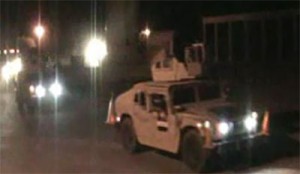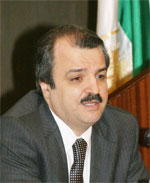THE WASHINGTON TIMES
Unarmed Iranian exiles in an Iraqi refugee compound fear another “bloodbath” by Iraqi soldiers after military vehicles rolled into the area late Monday, an Iranian source inside the compound told The Washington Times on Tuesday.
“Iraqi army battalions and Iraqi police are preparing to attack Camp Ashraf,” said Shahriar Kia, a spokesman for the Iranian resistance exiles in the compound.
They are “setting the stage for a bloodbath,” he said as he released a video recording of about 40 army and police vehicles driving into the compound with sirens blaring at about 11 p.m. Monday.
The authenticity of the video could not be confirmed independently.
Iraqi soldiers periodically have attacked the Iranians at Camp Ashraf over the past few years, most recently killing more than 30 refugees and injuring about 320 during a raid on the compound in April.
Ali Safavi, president of Near East Policy Research in Washington, said the latest threat to Camp Ashraf will be the subject of a congressional briefing Wednesday, when 40 House members will release a letter to U.N. Secretary-General Ban Ki-moon calling for his help in preventing more violence at the site.
“The situation at Camp Ashraf is growing more dire by the day,” Mr. Safavi said.
About 3,400 Iranian exiles live in Camp Ashraf, which has housed the People’s Mujahedeen of Iran, the former military wing of the Iranian resistance, since the 1980s. U.S. forces disarmed the Iranian rebels in 2003 after overthrowing Iraqi dictator Saddam Hussein.
Two years ago, the United States turned over control of the camp to the Iraqi government, which has announced plans to close the compound and relocate its residents by Dec. 31.
The exiles fear Iraqi Prime Minister Nouri al-Maliki will deport them to Iran, where they would face execution.
Mr. Maliki has called the mujahedeen a “terrorist organization,” relying on a 1997 State Department designation of the rebels as a terrorist group.
Mujahedeen rebels were accused of killing several Americans in Iran in the 1970s but have not threatened U.S. interests since then.
Mr. Maliki’s critics have accused him of attacking the compound to gain favor with Iran’s regime, which is believed to be increasing its influence over Iraq.
A U.S. federal court last year ordered the State Department to review its listing of the mujahedeen as a terrorist group. The European Union removed the group from its own terrorist list in 2009.
The Iranian resistance has been gaining support from several high-profile former officials who served under President George W. Bush, including former Attorney General Michael B. Mukasey and former Homeland Security Secretary Tom Ridge.
Howard Dean, an ex-chairman of the Democratic National Committee, also supports the resistance.
http://www.washingtontimes.com/news/2011/nov/1/iranian-exiles-in-iraq-fear-attack-from-iraqi-sold/

